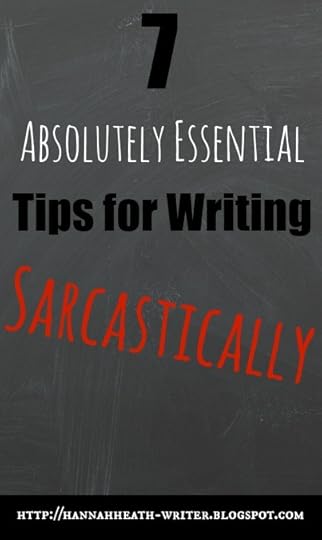7 Absolutely Essential Tips for Writing Sarcastically
Ah. The post you all thought you wanted. It's finally here. Hannah writing an instructional about how to incorporate sarcasm into writing. What could possibly go wrong?
 Before we get started, I am going to make two things abundantly clear. The word sarcasm? It doesn't mean what you think it means. In fact, when you use the word "sarcasm," the word you are looking for is probably "irony." See, irony is a type of humor where you express your meaning by using words or phrases that generally mean the opposite. Sarcasm is a subset of irony which uses irony in a malicious or slanderous way.
Before we get started, I am going to make two things abundantly clear. The word sarcasm? It doesn't mean what you think it means. In fact, when you use the word "sarcasm," the word you are looking for is probably "irony." See, irony is a type of humor where you express your meaning by using words or phrases that generally mean the opposite. Sarcasm is a subset of irony which uses irony in a malicious or slanderous way.
So, technically, I'm not sarcastic. At least not mostly. Maybe about 12%. The other 88% is ironic. Betcha didn't know that. Many thanks to my ironic, English-teacher of an Aunt for explaining that to me.
That being cleared up, I will now use the word "irony" throughout this post. Unusual, I know, since nobody uses correct English online anymore. Hopefully I don't destroy a whole fragile system.
Also, this post is going to be ironic. Very, very ironic. Some tips may be serious, but some may not be. How will you be able to tell the difference? Hm. Good question. I'll let you know once I figure out the answer.

Tip #1: Use irony to expose the ignorance and ridiculousness of a person or situation. You know when people are stupid in movies and the only way to straighten them out is to slap them across the face? That's what irony is for in writing. Except, if done incorrectly, rather than knocking some sense into them, it can knock what little sense there was right out of their brain. Irony is a very delicate thing. Use responsibly.
Tip #2: Everybody speaks irony, so don't be afraid to use liberally. It's not as if you're going to hurt anybody's feelings. When you use irony, everyone will know that you're using it and will probably laugh at your cleverness. It rarely happens that people will overlook your genius. Some suggest that you should make it abundantly clear from the start that you're not serious, perhaps by putting up a warning sign or overdosing right out the gate to show the ridiculousness of your words. Me? I don't think that's the way it should be handled.
Tip #3: Pair irony with a serious statement. Irony can be made better by using it as comic-relief in a dark moment. If you have a dark storyline, break it up with something ironic. It's best to give this 'breaking the darkness' role to one character, generally a brooding guy with dark hair and an "I'm ironic" sign hanging from his forehead. It's not as if other writers commonly do this. It's definitely not annoying, especially if it's mean-spirited or unrealistic.
Tip #4: Use all the punctuation and fonts! You can *never* overdose on all the awesome and ~totally helpful~ symbols, italics, and all-caps that your keyboard has to offer. When in doubt, ALWAYS convey your irony through the usage of these glorious keys. Winky smiley faces are also great and never frowned upon by editors. ;) I mean, if you didn't use these tools, people might be forced to use their brains. Last time that happened, people decided to put a 10-minute dance scene in Spider-Man 3. Oh. Wait. Maybe that's what happened when people don't use their brain? I'm not sure. All of this thinking is hurting me.
Tip #5: Exaggeration and deadpanning have no place in irony. Ever. You think I'm kidding? I'm not.
Tip #6: Take lessons from some of the great ironic writers and characters. Douglas Adams (The Hitchhiker's Guide to the Galaxy), Jonathan Swift (A Modest Proposal), Mark Watney (The Martian), William Golding (The Princess Bride), Jane Austen, Iron Man, Eeyore, Loki, Rocket Raccoon, Alfred Pennyworth, practically every character from Harry Potter.
Tip #7: Understand that irony can get old very fast. Some people can write entire books in an ironic tone and people love it, while others can't even make it past the first 10 pages without annoying everyone. Generally, self-deprecating or all-inclusive irony is more acceptable than sarcasm when writing for long periods of time. However, it can be really hard to gauge when you've gone too far, so it's best to stop when you're ahead. For example, I'm currently not sure whether this post is making you laugh or really getting on your nerves, so I'm going to stop now. Sorry. Or you're welcome. Whichever fits.
And there you have it. A very clear guide on how to write ironically.
One thing you should be aware of: With great irony comes great responsibility. Try not to use this type of humor to be hurtful. It's not nice and can wound other's feelings. Whatever those are.
What do you think? Is this a good guide for writing ironically? What tips would you add? Actually, I don't really care. Don't leave any comments. Most definitely do not share this posts with your friends and followers. And it's not like I want you to subscribe to my blog or anything crazy like that.
Related articles:
9 Ways to Use Reading to Improve Your Writing
Controlling Your Plot Bunnies: How to Write A Novel From Start to Finish Without Getting Distracted
The 5-Star Rating System: What Book Reviewers Mean VS How Indie Authors Take It

 Before we get started, I am going to make two things abundantly clear. The word sarcasm? It doesn't mean what you think it means. In fact, when you use the word "sarcasm," the word you are looking for is probably "irony." See, irony is a type of humor where you express your meaning by using words or phrases that generally mean the opposite. Sarcasm is a subset of irony which uses irony in a malicious or slanderous way.
Before we get started, I am going to make two things abundantly clear. The word sarcasm? It doesn't mean what you think it means. In fact, when you use the word "sarcasm," the word you are looking for is probably "irony." See, irony is a type of humor where you express your meaning by using words or phrases that generally mean the opposite. Sarcasm is a subset of irony which uses irony in a malicious or slanderous way.So, technically, I'm not sarcastic. At least not mostly. Maybe about 12%. The other 88% is ironic. Betcha didn't know that. Many thanks to my ironic, English-teacher of an Aunt for explaining that to me.
That being cleared up, I will now use the word "irony" throughout this post. Unusual, I know, since nobody uses correct English online anymore. Hopefully I don't destroy a whole fragile system.
Also, this post is going to be ironic. Very, very ironic. Some tips may be serious, but some may not be. How will you be able to tell the difference? Hm. Good question. I'll let you know once I figure out the answer.

Tip #1: Use irony to expose the ignorance and ridiculousness of a person or situation. You know when people are stupid in movies and the only way to straighten them out is to slap them across the face? That's what irony is for in writing. Except, if done incorrectly, rather than knocking some sense into them, it can knock what little sense there was right out of their brain. Irony is a very delicate thing. Use responsibly.
Tip #2: Everybody speaks irony, so don't be afraid to use liberally. It's not as if you're going to hurt anybody's feelings. When you use irony, everyone will know that you're using it and will probably laugh at your cleverness. It rarely happens that people will overlook your genius. Some suggest that you should make it abundantly clear from the start that you're not serious, perhaps by putting up a warning sign or overdosing right out the gate to show the ridiculousness of your words. Me? I don't think that's the way it should be handled.
Tip #3: Pair irony with a serious statement. Irony can be made better by using it as comic-relief in a dark moment. If you have a dark storyline, break it up with something ironic. It's best to give this 'breaking the darkness' role to one character, generally a brooding guy with dark hair and an "I'm ironic" sign hanging from his forehead. It's not as if other writers commonly do this. It's definitely not annoying, especially if it's mean-spirited or unrealistic.
Tip #4: Use all the punctuation and fonts! You can *never* overdose on all the awesome and ~totally helpful~ symbols, italics, and all-caps that your keyboard has to offer. When in doubt, ALWAYS convey your irony through the usage of these glorious keys. Winky smiley faces are also great and never frowned upon by editors. ;) I mean, if you didn't use these tools, people might be forced to use their brains. Last time that happened, people decided to put a 10-minute dance scene in Spider-Man 3. Oh. Wait. Maybe that's what happened when people don't use their brain? I'm not sure. All of this thinking is hurting me.
Tip #5: Exaggeration and deadpanning have no place in irony. Ever. You think I'm kidding? I'm not.
Tip #6: Take lessons from some of the great ironic writers and characters. Douglas Adams (The Hitchhiker's Guide to the Galaxy), Jonathan Swift (A Modest Proposal), Mark Watney (The Martian), William Golding (The Princess Bride), Jane Austen, Iron Man, Eeyore, Loki, Rocket Raccoon, Alfred Pennyworth, practically every character from Harry Potter.
Tip #7: Understand that irony can get old very fast. Some people can write entire books in an ironic tone and people love it, while others can't even make it past the first 10 pages without annoying everyone. Generally, self-deprecating or all-inclusive irony is more acceptable than sarcasm when writing for long periods of time. However, it can be really hard to gauge when you've gone too far, so it's best to stop when you're ahead. For example, I'm currently not sure whether this post is making you laugh or really getting on your nerves, so I'm going to stop now. Sorry. Or you're welcome. Whichever fits.
And there you have it. A very clear guide on how to write ironically.
One thing you should be aware of: With great irony comes great responsibility. Try not to use this type of humor to be hurtful. It's not nice and can wound other's feelings. Whatever those are.
What do you think? Is this a good guide for writing ironically? What tips would you add? Actually, I don't really care. Don't leave any comments. Most definitely do not share this posts with your friends and followers. And it's not like I want you to subscribe to my blog or anything crazy like that.
Related articles:
9 Ways to Use Reading to Improve Your Writing
Controlling Your Plot Bunnies: How to Write A Novel From Start to Finish Without Getting Distracted
The 5-Star Rating System: What Book Reviewers Mean VS How Indie Authors Take It

Published on June 24, 2016 09:13
No comments have been added yet.



